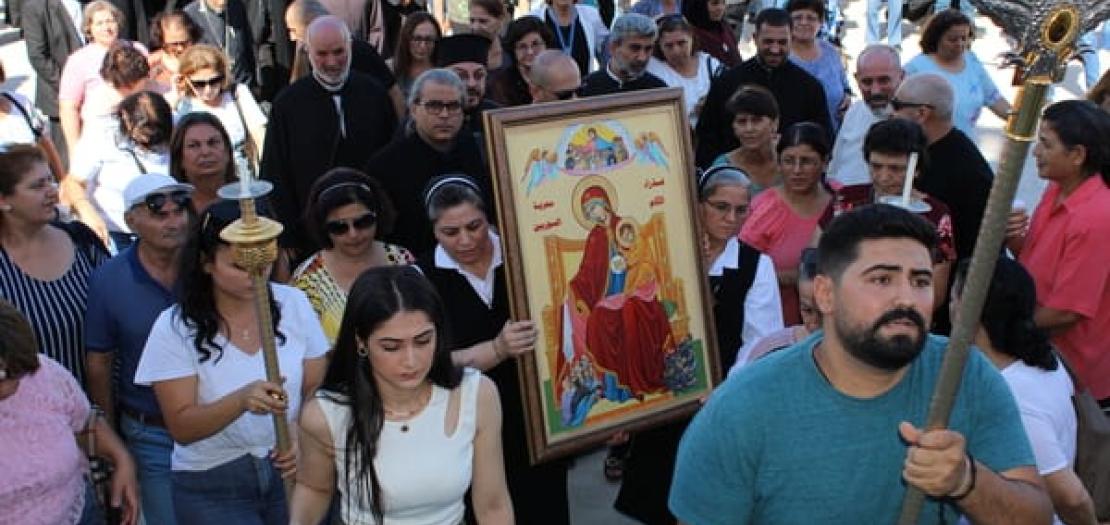Patriarch Youssef Absi, the leader of the Melkite Catholic Church, thanks Aid to the Church in Need for its support of Christians in Lebanon and Syria, but says that without justice for Palestine, there can be no stability in the Middle East.
Christians in the Middle East are leaving their ancestral homelands, despite their churches’ encouragement to stay, says Patriarch Youssef Absi, the head of the Melkite Catholic Church.
The Patriarch has led the Melkite Catholic Church for six years – a difficult period, with the civil war in Syria, the COVID-19 pandemic, and a financial crisis in both Syria and Lebanon. “All this has led to slow progress for our work. It has prevented us from carrying out our projects more quickly.” Nonetheless, he speaks of a “time of great grace.”
With most of his faithful in Syria and Lebanon, the Melkite Patriarch says that providing hope is increasingly difficult, especially to the young. “There have always been waves of emigration. But now, there are economic, social, and political reasons for it,” he told ACN.
“We are still doing everything possible to help our faithful, to provide them with essential services. But we cannot replace the government. There is no light at the end of the tunnel, and we do not see a short-term solution. Without support, we cannot convince them to stay.”
The situation in Syria could be improved if the West lifted economic sanctions, which, the Patriarch said, hurt civilians most. “I think that our friends can, in one way or another, pressure their governments, and sometimes their religious leaders, to help us somehow or to ensure that sanctions are lifted,” he added, echoing an appeal made recently by other Middle Eastern hierarchs.
Another decisive step in the right direction would be for the international community to finally find a solution to the Israel-Palestine conflict. “The Palestinian cause is the main cause. This is very clear for us here. Without a solution for the Palestinians, there is no solution for the Middle East. That means giving the Palestinians their independence. At the moment, we see that some Arab governments are starting to normalize relations with Israel, but this is not going to help because there continues to be great enmity between the people,” Patriarch Absi said.
But he insists that despite these difficulties, the Church’s efforts must continue, , since the prospect of a Middle East without Christians is unthinkable. Patriarch Absi offered the example of Lebanon, which has the greatest Christian population in the region, and which John Paul II famously described as a mission in itself: “Lebanon is very important, not only for the Middle East, but for all the world, because the coexistence between the Muslims and Christians there is an example for everyone.”
“In the West, there are many Muslims, and there are already some challenges, so the mission of Lebanon is to manifest how Muslims and Christians can live together. The presence of Christians in the Middle East should not be an issue. It’s normal for churches to exist there, and they should remain there,” Patriarch Absi went on to say.
A Christian safe zone?
As the persecution of Christians in the Middle East reached its peak in 2014, some people showed interest in creating a Christian safe zone, either in a country or an autonomous region, like the Nineveh Plain in Iraq.
But most Christian religious leaders are opposed to the idea, and Patriarch Absi is no exception. “It would be suicide,” he said. “It is not a solution.”
Christians and Muslims, he explained, have a history of coexistence, and carving out an exclusively Christian area would anger other citizens. “You have the right to live in a large country. Why would you choose to live in a small country surrounded by people who have become your enemies?”
The situation in Syria and Lebanon may be dramatic, but it would be worse without the aid of ACN.
“We have noticed that ACN has doubled, and sometimes tripled, its aid over the course of the last decade. The results are clearly visible, and we thank you from the bottom of our hearts. We can see that you really want to be present in Syria and Lebanon in a special way.”
“It is not just financial or economic aid. It’s the spirit with which they work: the generosity, the love, the smiles. We give thanks to God for having sent us brothers and sisters of this caliber,” the Patriarch concluded.
By Filipe d’Avillez & Maria Lozano






